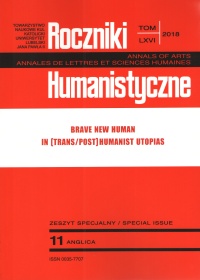Transhumanist Dreams and/as Posthuman Nightmares in Black Mirror
Abstrakt
Transhumanistyczne sny i/jako posthumanistyczne koszmary w Czarnym zwierciadle
Niniejszy artykuł poddaje analizie serial telewizyjny Czarne zwierciadło jako swoistą polemikę z transhumanizmem, prądem filozoficznym propagującym (bio)technologiczne ulepszenie jako środek, który pozwoli ludzkości przekroczyć biologiczne ograniczenia i osiągnąć nowy, post-ludzki etap ewolucji. Wychodząc od tendencji dających się zaobserwować we współczesnym społeczeństwie, Czarne zwierciadło przedstawia w fikcyjnej formie takie koncepcje transhumanistyczne jak świadomość oddzielona od ciała, czy też wzmocnione poznanie i sugeruje, że w większości przypadków mogą się one przyczynić do rozwoju post-ludzkiej dystopii raczej niż utopii, zakładanej przez transhumanistów.
Bibliografia
Bostrom, Nick. “Letter from Utopia.” Nick Bostrom’s Home Page. 2010. Web.
Bostrom, Nick. “Why I Want to Be a Posthuman When I Grow Up.” The Transhumanist Reader: Classical and Contemporary Essays on the Science, Technology, and Philosophy of the Human Future. More and Vita-More, eds. 28–53. Print.
Claeys, Gregory. Dystopia: A Natural History. A Study of Modern Despotism, Its Antecedents, and Its Literary Diffractions. Oxford: Oxford University Press, 2017. Print.
Clark, Andy. Natural-Born Cyborgs: Minds, Technologies, and the Future of Human Intelligence. Oxford: Oxford University Press, 2003. Print.
Elsaesser, Thomas. “The Mind-Game Film.” Puzzle Films: Complex Storytelling in Contemporary Cinema. Ed. Warren Buckland. Chichester: Wiley-Blackwell, 2009. 13–41. Print.
Hauskeller, Michael, Thomas D. Philbeck, and Curtis D. Carbonell, eds. Palgrave Handbook of Posthumanism in Film and Television. Houndmills: Palgrave Macmillan, 2015. Print.
Hauskeller, Michael, Thomas D. Philbeck, and Curtis D. Carbonell. “Posthumanism in Film and Television.” Hauskeller, Philbeck, and Carbonell, eds. 1–7. Print.
Hayles, N. Katherine. How We Became Posthuman: Virtual Bodies in Cybernetics, Literature, and Informatics. Chicago and London: University of Chicago Press, 1999. Print.
Krueger, Joel. “At Home In and Beyond Our Skin: Posthuman Embodiment in Film and Television.” Hauskeller, Philbeck, and Carbonell, eds. 172–181. Print.
“Men Against Fire.” Writ. Charlie Brooker. Dir. Jakob Verbruggen. Perf. Malachi Kirby, Madeline Brewer. Black Mirror. Netflix. 2016. Web.
More, Max. “The Philosophy of Transhumanism.” More and Vita-More, eds. 3–17. Print.
More, Max and Natasha Vita-More, eds. The Transhumanist Reader: Classical and Contemporary Essays on the Science, Technology, and Philosophy of the Human Future. Malden: Wiley-Blackwell, 2013. Print.
“San Junipero.” Writ. Charlie Brooker. Dir. Owen Harris. Perf. Gugu Mbatha-Raw, Mackenzie Davis. Black Mirror. Netflix. 2016.
“Transhumanist Declaration.” World Transhumanist Association. 1998. Web.
Various. “Transhumanist Declaration (2012).” More and Vita-More, eds. 54–55. Print.
Copyright (c) 2018 Roczniki Humanistyczne

Utwór dostępny jest na licencji Creative Commons Uznanie autorstwa – Użycie niekomercyjne – Bez utworów zależnych 4.0 Międzynarodowe.





